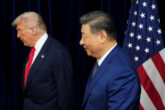April 11, 2017
Maritime Power and U.S. Strategic Influence in Asia
Three decades ago, Gen. Liu Huaqing, the military commander who modernized China’s navy declared, “Without an aircraft carrier, I will die with my eyelids open.” When he passed away in 2011, China had finally started building an aircraft carrier and it took to the seas the next year. If recent trends were to hold, it is doubtful whether the U.S. Navy could preserve its longstanding supremacy for sea control — especially within Asia’s first island chain — even a decade or two into the future.
The loss of U.S. global maritime dominance would put at risk fundamental national interests, effectively most of what we as Americans take for granted. Certainly, it would call into question the ability of the United States to command offshore lines of communication. That perceived or actual loss of sea control would undermine the movement of the U.S. armed forces in support of operational plans to counter provocation and proliferation, preserve the independence of democratic allies and partners, ensure the free flow of commerce, and keep potential adversaries on their back foot and far from our shores.
Yet by all appearances American maritime power is steadily eroding. Partly this is a natural consequence of structure: new rising centers of power resulting from a worldwide redistribution of wealth and technology. But we cannot ignore agency. China — historically a land power — has clearly and deliberately sought to challenge U.S. maritime power. The rise of China’s blue water navy is backed by a formidable precision long-range strike capability and key enablers in cyber and outer space, all in turn supported by comprehensive instruments of power. This trend, which can be likened to America overtaking British seapower, should capture the attention of U.S. officials and, to the extent they still exist, strategic planners. The United States is being outmaneuvered in China’s near seas. The resulting pressure to fall back could result in severe limits on future U.S. power projection in the world’s most consequential region — what Nicholas Spykman called the “Asiatic Mediterranean.”
Read the full article at War on the Rocks.
More from CNAS
-
Chinese Maker of Bitcoin-Mining Machines Is a Security Threat, Says Expert
Bloomberg News reports that a Chinese manufacturer, Bitmain Technologies Ltd, that sells most of the world’s Bitcoin-mining machines — including 16,000 of them to a venture ba...
By David Feith
-
Indo-Pacific Security / Energy, Economics & Security
North Korea’s Provocations, Power Plays, and Shifting AlliancesTensions on the Korean Peninsula have reached a new and dangerous threshold. President Lee Jae Myung is warning of a real risk of accidental military clashes, as the situation...
By Dr. Go Myong-Hyun
-
Indo-Pacific Security / Energy, Economics & Security
How to Win the Economic War with ChinaTrump's approach to China has run aground, giving Beijing unprecedented advantage in the economic conflict....
By Edward Fishman & Julian Gewirtz
-
Indo-Pacific Security / Technology & National Security
Sharper: Tech + ChinaRecent talks between President Donald Trump and Chinese Communist Party General Secretary Xi Jinping placed a spotlight on emerging technologies, from high-end chips to minera...
By Charles Horn & Sevi Silvia




